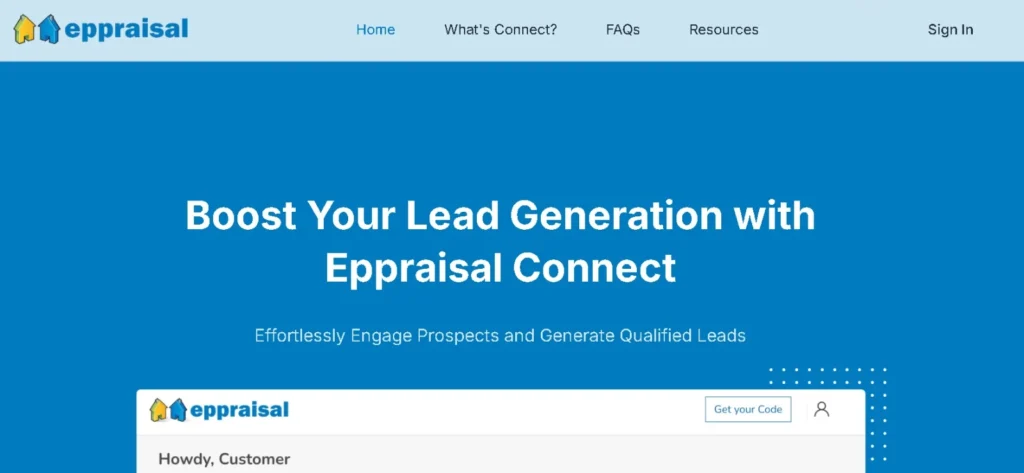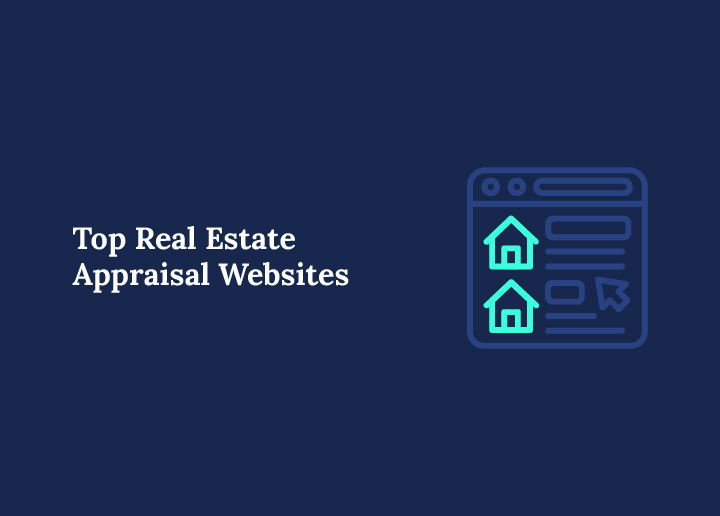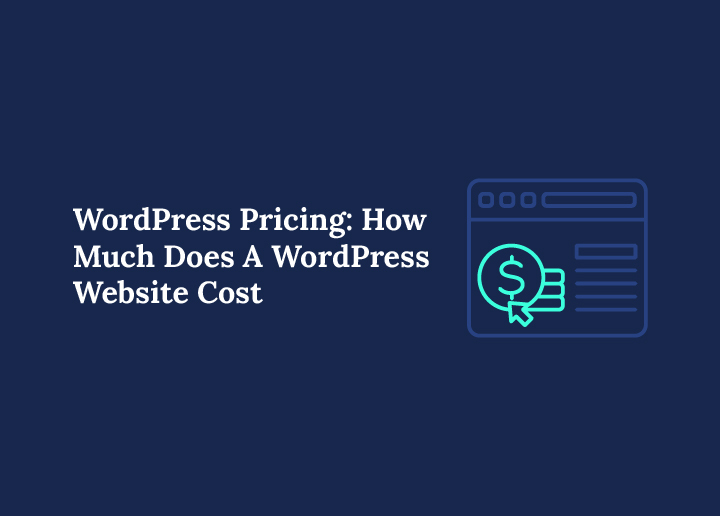Today, you don’t have to rely only on a licensed appraiser or local real estate agent, modern online tools give you an instant home value estimate using public records, recent sales, tax assessments, and local market trends. In this guide, we’ll explore the top real estate appraisal websites in 2025, from trusted names to popular tools with low median error rates, to help you find the most accurate number and make smarter decisions in today’s real estate market.
Why Use Real Estate Appraisal Websites?
Real estate appraisal websites have become a go-to resource for homeowners, buyers, and sellers because they provide convenience and instant estimated values without the long wait of traditional appraisals.

Instead of scheduling a licensed appraiser and paying high fees, these online home platforms let you enter a home address and get an estimate based on publicly available data, public records, comparative market analysis, and even sale prices of similar properties in the same location.
Most of these tools use advanced algorithms, MLS data, and even AI tools to consider other factors like recent renovations, home improvements, square footage, and property type.
By doing so, they generate a more accurate estimate of your property’s estimated value compared to simply guessing or relying on outdated data. Some websites even share value history, home price trends, and important information about the neighborhood to give a fuller picture of your property’s worth.
Another big advantage is cost-effectiveness. Many sites are free to use, while some company offers include a free consultation with a local real estate agent if you want more personalized advice.
Users can also read customer testimonials or client testimonials to gauge how reliable the platform is. These features make appraisal websites a useful starting point for anyone preparing to sell, buy, or refinance a home in today’s competitive real estate market.
Discover: Best Real Estate Directory Templates
Key Features to Look for in a Real Estate Appraisal Website
Not all appraisal websites are created equal. To get the most from an estimator tool, you’ll want to make sure the platform provides accuracy and reliability.
The best websites use a mix of comparative market analysis, public data, and recent sales to ensure the estimated value you see is as close as possible to the real figure. Some platforms even display the median error rate or explain how their estimate based system works, giving you transparency on how accurate the tool is.
A well designed website also makes a big difference. Look for clear navigation, a simple color scheme, and plenty of white space that make important information easy to find.
Features like property listings, comparable homes, and prominently displayed valuation details improve the overall user experience. Some sites also integrate home loan options, mortgage calculators, and neighborhood insights to help you explore options beyond just the appraisal.
Mobile accessibility is key too. Many of the top appraisal sites are optimized for smartphones, so you can check an estimated home value on the go, simply by entering a home address.
Some company offers include special services like instant connection to agents, while others highlight how long they’ve been around, some platforms have been refining their services for eight years or more.
Finally, look for extras that add real value: tools that account for recent renovations, provide insights into property type, or include customer testimonials that build trust.
A reliable appraisal site should act as more than just an estimator tool, it should be an all-in-one hub to help you make smarter real estate decisions, whether you’re buying, refinancing, or planning to sell.
Learn More: What are Navigation Menus in WordPress
Make Your Real Estate Business Stand Out with A Stunning!
Our expert design team builds modern, SEO-friendly sites that attract buyers and sellers.
Top Real Estate Appraisal Websites in 2025
If you’re looking for a reliable estimated home value online, these platforms stand out in 2025. Each one has its own strengths, from comparative market analysis tools to publicly available data insights, helping you make smarter real estate decisions.
Zillow Zestimate
Zillow’s Zestimate is one of the most widely recognized estimator tools, offering quick estimated values for millions of properties across the U.S. By using public records, recent sales, square footage, property type, and home price trends, Zillow provides users with an estimate based on real-time public data.

It also shows value history, neighborhood insights, and on market homes alongside off market homes, giving users a clear picture of the real estate market.
Zillow highlights its median error rate so users can understand the tool’s accuracy. With a well designed website and prominently displayed property details, it’s often the first useful starting point for those planning to buy, refinance, or sell.
Realtor.com
Backed by MLS data, Realtor.com offers one of the most accurate estimates available online. It provides a deep comparative market analysis, highlighting recent sales, comparable homes, and sale prices in the same zip code.

The platform makes important information easy to find with a clean color scheme and thoughtful white space on its site. Realtor.com also connects users with a local real estate agent and offers extra services like mortgage calculators and home loan options, making it much more than just an appraisal tool.
Redfin Estimate
Known for its accuracy and transparency, Redfin’s Estimate tool is often praised by senior editors and real estate professionals. Redfin’s model draws on public data, publicly available records, and other factors like recent renovations and home improvements to generate an accurate number.

What sets Redfin apart is its clear explanation of how it calculates your estimated price and its willingness to display the median error rate. Redfin’s well designed website also allows users to explore property listings, track home price trends, and compare similar properties with ease.
Eppraisal
Eppraisal is a free estimator tool that offers instant estimated values with easy side-by-side comparisons. It pulls from publicly available data, public records, and recent sales to create an estimate based on location, square footage, and property type.

Eppraisal also includes important information like value history, home price trends, and sale prices of comparable homes. Its straightforward design, customer testimonials, and user-friendly interface make it a reliable useful starting point for both buyers and sellers.
HomeLight
HomeLight goes beyond just providing an estimated price, it connects users with local real estate agents who can give more tailored advice.

The platform combines its estimator tool with features like client testimonials, company offers, and insights into comparable homes in the same zip code. It also highlights services like agent matching, making it a great resource for homeowners who want to sell quickly with professional support.
HomeLight’s well designed website and prominently displayed features make navigation simple, and its customer testimonials build trust for new users.
SmartZip
SmartZip is designed with investors and sellers in mind, offering predictive analytics that go beyond a simple estimated home value. Using comparative market analysis, public data, and predictive modeling, it identifies the best location and timing to sell or invest.

The platform considers other factors such as recent renovations, home improvements, and property type. For users looking to explore options beyond basic appraisals, SmartZip provides valuable important information and marketing tools that can help optimize real estate decisions.
Pros & Cons of Using Online Appraisal Tools
Here are the pros:
Online appraisal tools offer fast, free, and convenient access to estimated home values for virtually any home address. With just a few clicks, you can use estimator tools that draw from publicly available data, comparative market analysis, sale prices, and recent sales to get a clear snapshot of the real estate market.
Many platforms also include property listings, value history, and home price trends, making it easier to explore options for selling, home purchase, or refinancing.
Another advantage is accessibility: these tools are available on mobile or desktop, often with a well designed website that emphasizes important information, white space, and a clear color scheme.
Some sites even offer extras like customer testimonials, home loan options, and free consultation services, making them a useful starting point for homeowners and buyers alike.
Here are the cons:
While online appraisal tools are convenient, they are not always 100% accurate. Many rely on public data, tax assessments, and comparable homes in the same location or zip code, but may not fully account for recent renovations, home improvements, or unique property types.
Market fluctuations and other factors can also affect the estimated value, meaning the number you see may differ from a professional appraisal.
Because of these limitations, online estimates should be seen as a guide, not a final word, and may lack context that a licensed appraiser or local real estate agent would consider.
Learn More: Top Web Design Trends
When to Consider a Professional Appraisal Instead
There are certain situations where an online home estimate isn’t enough, and a professional appraisal is the better choice.
For instance, if you’re refinancing, completing a home purchase, involved in legal matters, or conducting an official property transaction, you’ll need a formal valuation from a licensed appraiser.
Professional appraisals provide a deeper, more precise evaluation using comparative market analysis, square footage, property type, recent renovations, and sale prices of comparable homes.
They often reference public records, tax assessments, and median error rates to deliver an accurate estimate tailored to your specific home address.
Even if you’ve used an estimator tool online, these estimates should be treated as a useful starting point.
A professional appraiser can factor in other factors, like unique home improvements, location nuances, or off market homes, to ensure that the final estimated value is precise enough for sale, refinancing, or home loan options.
How to Get the Most Accurate Online Appraisal
To make the most of online appraisal tools and get a reliable estimated home value, it’s important to follow a few best practices. First, cross-check multiple platforms.
Each website, from Zillow Zestimate to Property Shark, uses slightly different comparative market analysis methods and publicly available data, so comparing results can help you identify a more realistic estimated price.
Next, update property details whenever possible. Make sure your home address, square footage, property type, and any recent renovations or home improvements are correctly entered.
Accurate inputs help estimator tools calculate an estimate based on the most relevant public data, recent sales, and sale prices of comparable homes in your location.
Finally, always compare with recent comps in your area. Many online platforms provide comparable homes and home price trends, but it’s helpful to manually check on market homes, off market homes, and similar properties in the same zip code.
This ensures that your estimated value accounts for other factors like neighborhood demand, home loan options, and home improvements that might not be fully reflected in the tool. Combining these steps will give you a more confident and accurate picture of your home worth.
Find Out: Best Industrial Web Design
Conclusion
Top real estate appraisal websites have revolutionized how homeowners, buyers, and sellers access property valuation information. With fast, user-friendly tools that leverage publicly available data, recent sales, comparative market analysis, and median error rates, these platforms provide a useful starting point for understanding your property’s estimated home value.
While online estimates are convenient and often cost-effective, they should be seen as a first step. For critical decisions like refinancing, home purchase, or official property transactions, consulting a licensed appraiser or local real estate agent remains essential.
Explore these websites to access important information, view comparable homes, track home price trends, and make informed choices in the real estate market in 2025. With these tools, you can confidently explore options, check property listings, and understand your home worth before taking the next step.
FAQs About Real Estate Appraisal Websites
Why should appraisers invest in a professional website?
Your website is often the first impression clients get. A polished, well-designed site builds trust and makes you stand out from competitors. Plus, it helps generate leads 24/7 through online forms, booking tools, and SEO visibility.
What features should appraisers add to their websites in 2025?
Features like instant appraisal request forms, live chat, Google Maps integration, and client testimonials are key. Adding educational content and market insights can also position an appraiser as an authority in their local market.
How do top real estate appraisal websites attract clients?
They use local SEO strategies, strong calls-to-action, and helpful resources like blog posts or FAQs. Many also integrate online scheduling, instant quote tools, and detailed service pages to make the client’s decision easy.
What makes a great real estate appraisal website in 2025?
A great appraisal website is clean, mobile-friendly, and easy to navigate. It should highlight services, showcase credibility with licenses and testimonials, and make it simple for visitors to request an appraisal online. Fast loading speed and clear contact options are also must-haves.



